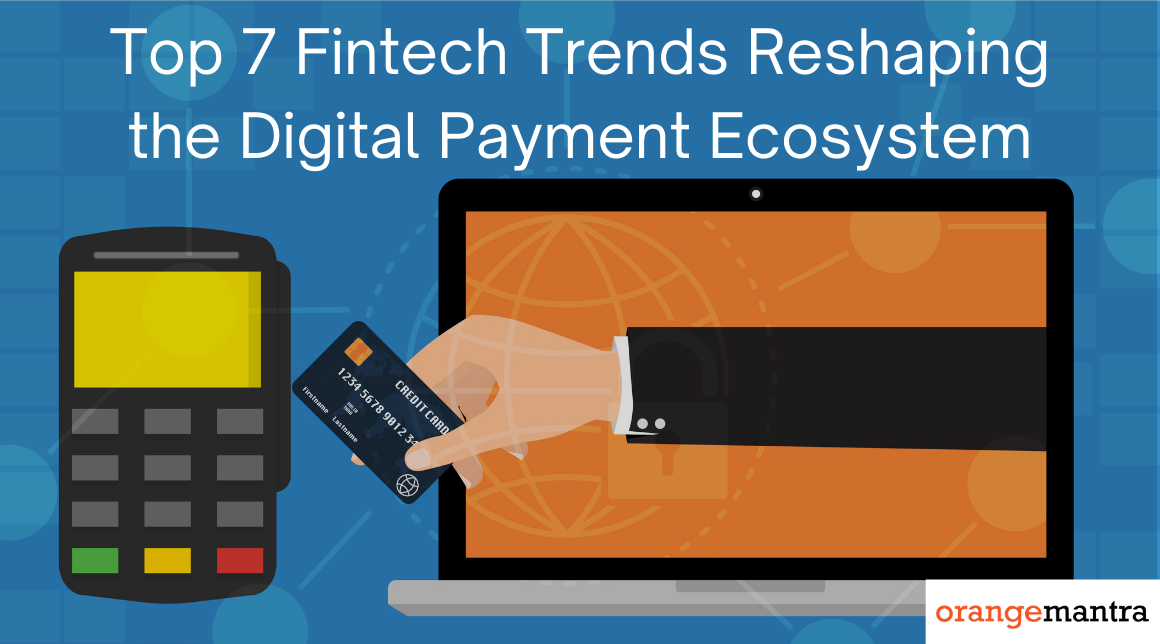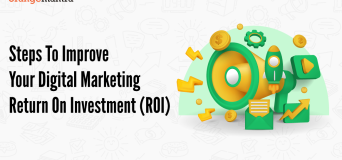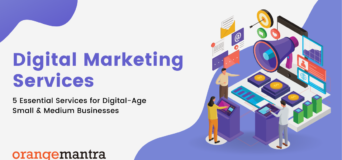Digital payment trends were growing worldwide, even before the pandemic hit. But as the fear of COVID-19 drove people to an online shopping frenzy, tech-enabled payments grew as never before. From digital wallets to QR codes and NFC, everything suddenly became mainstream. And industry experts believe these trends are likely to stay even after the health crisis is over. The widespread consumer acceptance has prompted the evolution of digital payment solutions at an unprecedented pace.
In this post, we will discuss seven top trends that have the potential to transform the future of payment processing. Be it business-to-business or business-to-consumer transactions, these fintech trends are everywhere. Read on to know how they’re reshaping the payment ecosystem.
Top digital payment trends driven by fintech solutions
Digital wallets are not new to the payment ecosystem. But the scale at which they’re being used amid the pandemic has caught the attention of industry experts in Silicon Valley and elsewhere in the world. Be it the rapid growth of digital wallets or the rise of QR codes, these trends are significant in many ways.
Blending fintech with banking
Fintech solutions enabled the banking industry to address customer demands in a dramatically changed world. As lockdown and social distancing measures were implemented, banks continued operations using a diverse array of digital solutions. From mobile banking to contactless payment, these software-enabled solutions helped banks to sustain services amid health safety measures.
The banking industry caters to a large customer base. An array of highly evolved digital payment solutions is enabling banks and other financial institutes to avoid coronavirus-induced disruptions. Their collaboration with fintech companies enables them to create highly customized solutions that boost efficiency. Customer needs and market demands often drive the evolution of these solutions.
Increasing reliance on the cloud
Cloud-based fintech solutions are seeing growing adoption among big companies and medium enterprises alike. Cloud solutions provide immense scalability, flexibility, and cost-effectiveness. They are also easy to access from anywhere. These solutions rely on a network of remote servers hosted on the cloud. The servers securely store and manage payment data. With cloud solutions, businesses can leverage advanced capabilities automation, BI, and analytics, among others.
Data security is a top concern when it comes to online payment solutions. Cloud-hosted solutions offer capabilities like financial data protection through encryption, and other advanced security measures. Cloud ERP solutions providers are continually upgrading their services to ensure more and more robust security to their clients. Ramped-up security measures are helping businesses reduce the number of data breach attacks substantially.
Rapidly evolving B2B payment
The transformation of payment methods is not confined to business-to-consumer transactions. The business-to-business landscape, too, is responding nimbly to evolving financial service solutions. As the fintech industry scales up to upend traditional financial services, businesses are increasingly embracing innovative solutions.
B2B fintech solutions bring an array of advantages for business owners. From faster payment processing to superior security and personalized payment gateways, B2B transactions are transforming in many ways. With soaring investments in B2B payment solutions, this area of fintech is likely to evolve at an incredible pace.
Digital wallets are mainstream
As consumers worldwide started to shop everything online amid the fear of coronavirus, the use of digital wallets reached a record-setting level. Even when customers are shopping in person, digital wallets are preferred over cash. And this dramatic rise in popularity of e-wallets is not without reason. Digital wallets combine convenience and safety. Besides, digital payment platforms offer attractive deals to keep consumers loyal to the services.
Many businesses have even made digital payment a mandate at their physical stores. It’s in keeping with the W.H.O.’s COVID-safety guidelines. The trend of using digital wallets like Amazon Pay, Google Pay, and Paytm is likely to grow further over the coming years.
Mobile payments are everywhere
Whether it’s digital wallets, net banking, or QR code-based payments, most consumers are using mobile devices. Most companies today are focused on consumer experience on mobile devices — be it eCommerce or online payment.
In emerging markets like India, the use of smartphones has skyrocketed over the past couple of years. It has prompted global fintech giants to shift their focus to India. From Google Pay to Amazon Pay, every company is trying to capitalize on the sprawling Indian market. Businesses with mobile-first digital payment solutions are, therefore, having a competitive advantage in such markets.
NFC- & EMV-based payment processing
Near Field Communication (NFC) was introduced in the payment ecosystem as a high-security method. Its popularity grew almost quickly. But the health safety measures, now commonplace across industries, have given it a new impetus. More small and medium businesses today are using NFC-enabled ‘tap-and-go’ contactless payment devices. It has helped businesses to improve convenience, safety, and payment security amid COVID-triggered anxieties.
EMV, short for Europay, MasterCard, and Visa, also works like NFC. With EMV devices, merchants can reduce the liability of payment processing by enabling more security. Both NFC and EMV are forecast to make better inroads among small and mid-sized merchants in emerging markets.
Unified commerce is on the horizon
Unified commerce is likely to be the next big thing in the digital commerce world. It’s a concept of bringing together multiple facades of eCommerce, including m-Commerce, CRM, inventory management, and POS, and payment processing, among others. Unified commerce helps you take the omnichannel commerce experience to the next level.
With custom eCommerce solutions, you can create seamless shopping experiences for customers by providing them with all-inclusive features and capabilities. On the other hand, retailers get a comprehensive view of their operations with better analytics and deeper insights. Payment solutions play a crucial role in creating an enticing unified commerce experience.
Rounding off
The evolution of fintech solutions and the growth of digital payment processes go hand in hand. As we prepare for a post-COVID business world, these trends are likely to stay on the top of medium- and long-term business plans of CXOs and entrepreneurs.
In a ruthlessly competitive market, you cannot imagine the desired growth without top-notch tech solutions. And digital payment solutions must secure a top spot on the list of tech solutions you use. OrangeMantra has a proven record of helping clients achieve their business goals while wading through the competition. We build deeply customized enterprise solutions per your specific requirements.
FAQs
Q. Why is digital payment important?
Digital payment solutions have become a valuable tool for advancing businesses and improving customer experience. Digital payment lowers the cost of providing seamless financial services to your customers. It also increases the safety and convenience of customers for accessing services like fund transfer, insurance, and savings.
Q. How much does it cost to build a fintech solution?
Fintech solutions comprise a vast range of financial software, mobile app, and digital wallets, etc. The cost of development depends on what kind of fintech solution you need. OrangeMantra offers secure fintech solutions at a competitive price.
Q. What is cloud ERP?
Cloud-based ERP is a type of enterprise resource planning (ERP) software that runs on a cloud computing platform rather than on a business’s premises. Cloud or online ERP solutions offer noticeable benefits in terms of cost and efficiency.






















